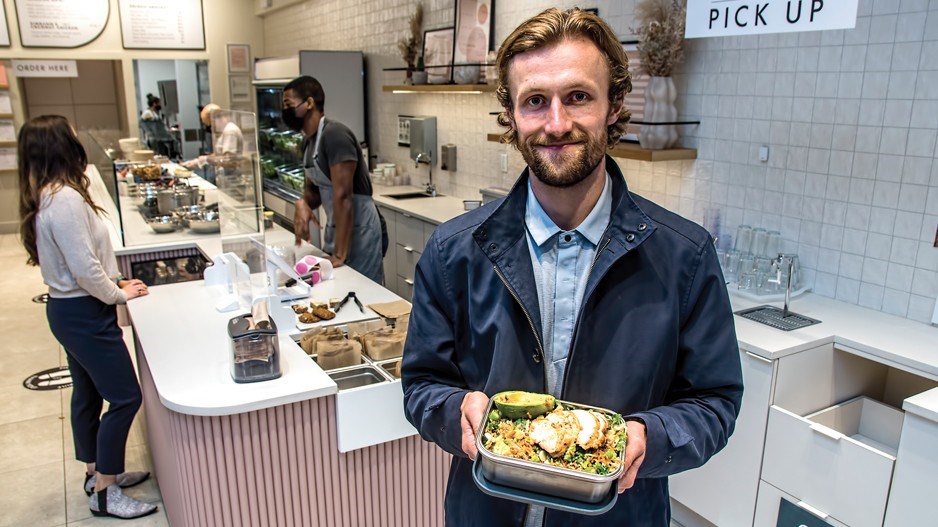Pile-ups of takeout containers creating cringing Canadian consumers is a business model Jason Hawkins feels confident he can count on.
“During the [start of the] pandemic, packaging waste was skyrocketing just as fast as food delivery was skyrocketing,” recalled the co-founder of Circular Solutions Inc. (doing business as Reusables Co. or, simply, Reusables.com).
Instead of those containers turning into towers destined to be flung in the garbage or recycling after a week’s worth of ordering delivery, Hawkins and his team set about developing a business model that could rely on consumers’ desire to reduce waste.
Disposable takeout boxes have now given way to reusable containers at more than a dozen local restaurants through a subscription-based model pegged at $5 a month.
Food arrives in a reusable container, returned by the customer within 14 days and sanitized at a commercial cleaning facility. A QR code linked to the individual containers confirms their return.
Hawkins likens it to how restaurants wash dishes after each use rather than throwing them away (the company estimates each container will get about 1,000 uses).
It’s not something that necessarily would have been viable a decade ago, the co-founder acknowledged, but broader consumer interest in preserving the environment and advances in mobile technology have changed that.
“One of the barriers with reuse models in the past is that they relied on the deposit, which can become quite a barrier for people to adopt reuse,” Hawkins said.
“Think of the milkman. Well, that’s one thing. But what if you have a stainless-steel container that has a retail value of $40? It becomes challenging to put a deposit when your average order size for food delivery might be only $20.”
Users at Reusables.com can get unlimited access to reusable containers at select restaurants and – beginning later this month – grocery stores for everything from food to coffee.
“It’s more like a library card system,” Hawkins said.
“So if you return on time, you don’t get charged more. If you return a few days late, we’re just going to charge you a nominal fee per day.”
So far, 15 restaurants have signed up to offer this service to customers since the launch of a pilot earlier this year. Diners can call the restaurant for their order and let them know they’re signed up for the service, or they can use apps like Uber Eats or SkipTheDishes Restaurant Services Inc. and select the option from the participating restaurant for reusable containers to get them delivered.
Participating restaurants include Field & Social, MeeT in Gastown, Bandidas Taqueria, True Confections and Dosanko Japanese.
“We had a goal of signing up just 100 users … [in] February, March. We doubled that goal within two weeks,” Hawkins said.
While COVID-19 brought on considerable economic uncertainty around the globe, some sectors have benefited significantly as a result.
Consumer data firm Statista Inc. reports revenue generated by food delivery apps in Canada reached US$2.7 billion in 2019. That figure has surged during the pandemic and is projected to reach US$6.3 billion by the end of 2021.
“We started this understanding that COVID-19 was the primary problem among people’s minds, in governments’ minds. Our bet was that sustainability would become the biggest problem on people’s minds after COVID-19,” Hawkins said.
“What we decided to do was really invest in this business throughout the height of the pandemic. The fact that restaurants were doing more takeout than usual definitely helped our case. But what we see happening is that our model works.” •




